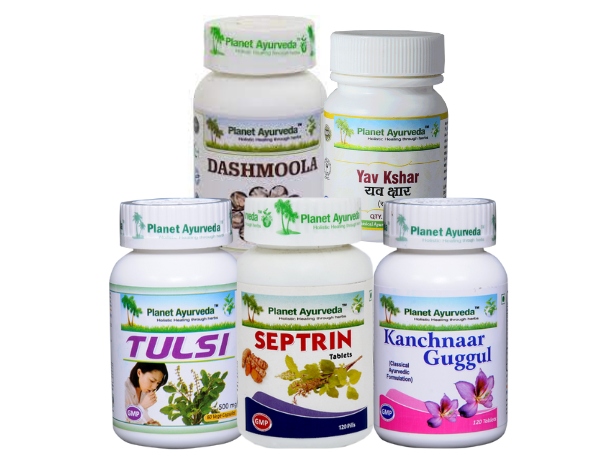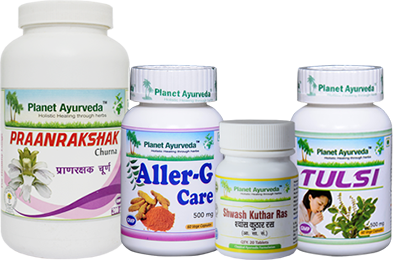How to Get Rid of Nasal Polyps Through Ayurveda
Abstract
Air is such an important aspect of life to survive, also called as “pranavayu”. Nose is our prime organ of olfaction. One cannot imagine life without a nose. It is the passage of pure filtered air to the lungs. But there are certain conditions where the passage of air is blocked. And one such condition is nasal polyps. They are bump like structures inside the nasal cavity that block air flow and prevent filtration of the air. It gives the feeling of irritation to the person. These are commonly non cancerous growth (benign). These are the result of recurrent inflammation or infections, aleeries, asthma etc. They may vary in size, big or small. Estimated population having this condition is around 4-40 %. Nasal polyps are usually more common in males than females. Affected population is young adults or middle aged adults. So let’s begin with reading all about nasal polyps in detail, their causes, their symptoms, what do we call it in ayurveda, how to manage the situation according to the Indian system of medicine and Modern aspects.

Introduction
Nasal polyps are painless, soft, benign (non cancerous) round growth (cyst) found in the sinuses and nasal passage. They can be small or big in size. Small nasal polyps may be symptomless. Nasal polyps that are big in size that may block the nasal cavity, that may raise some serious breathing issues, loss of smell etc. Nasal polyps result from the chronic inflammation in the mucus membrane due to recurrent respiratory infections, asthma, some immune disorder or some drug sensitivity (NSAIDS). Nasal polyps are most common in adults but can happen at any age. After it resolves its chances of recurrence are there. Sometimes inheritance is responsible for the nasal polyps.
Four stages of polyps
- Limited only to middle turbinate
- Extending beyond middle turbinate
- Approaching towards inferior turbinate
- Extending upto the floor of the nose
According to the location there are mainly two types of polyps
Ethmoidal polyp
- Located in ethmoid cavity
- Common in adults
- Tendency to grow forward
- Tendency to recurrence
- They are usually multiple in number
Antrochoanal Polyp
- Located in antrum
- Common in children and young adults
- Tendency to grow backwards or posterior
- Recurrence is rare after removal
Causes and Risk factors
Nasal polyps are usually associated with some diseased condition as given below
- Frequent Asthma attacks
- Hay fever or allergic rhinitis
- Allergic fungal sinusitis
- Chronic rhinitis
- Repeated sinus infections
- Cystic fibrosis
- Drug sensitivity non steroidal anti inflammatory drugs(NSAIDs) like aspirin. Ibuprofen
- Inheritance
- Churg-Strauss syndrome (inflammation of blood vessels)
- Low in immunity
- Vitamin D deficiency
Signs and symptoms
- Person suffers from runny nose (nasal drainage)
- Nasal fullness or stuffiness
- Blocked nose
- Nasal congestion
- Anosmia (loss of smell)
- Rise of snoring
- Sleep apnea
- Secretions or mucus runs down the back of the throat or post nasal drip
- Frequent bleeding from the nose
- Headache or facial pain
- Feeling of pressure over forehead, face, sinuses or top tooth
- Difficulty in breathing
- Rarely blurred vision or reduced vision
- High fever
- Pain in the nose
Complications
- Obstructive sleep apnea
- Flaring up of asthma
- Recurrent sinus infections
Diagnosis
- Medications to reduce infla
- Based on history of especially recurrent infections, asthma attacks, allergies
- Based on symptoms
- Nasal endoscopy
- CT scan
- MRI
- Allergy test
Prevention
- Maintaining good hygiene
- Taking proper medications for asthma or allergies
- Using humidifier at home to keep air moist
- Washing nasal passage with saline
- Avoiding dust or allergens
- Steam to clear nasal passage
- Stay hydrated
- Stop smoking
Management
- To shrink the polyps one should spray steroids
- Decongestant nasal drops
- Oral steroidal medication (budesonide, fluticasone etc)
- Injection under the skin (dupilumab, prednisolone)
- Antihistamine (montelukast)
- Antibiotics
- Endoscopic removal of the polyp
- Polypectomy (smaller polyps)
Note
Nasal polyps show recurrence about 15% of people, they often revert back after treatment.
Many people follow repeated surgery or prolonged steroid intake.
Ayurvedic aspect and management of Nasal polyp
Ayurveda is an Ancient Indian System of medicine that has been existing for thousands of years. Ayurveda is a systematic and planned procedure aiming at balancing the elevated doshas (vata, pitta and Kapha) and dhatus with the help of certain herbal drugs, panchkarma, diet and lifestyle modification. Its prime focus is prevention of the ailment and providing higher quality of health. Ayurveda believes in the natural process of healing. Ayurveda has a solution to every problem.
Nasal polyp as per ayurveda is called “Nasa Arsh”. Acharya sushrut mentioned four types of nasa Arsh in ancient texts: vata, pitta, kapha and sanipataj. And symptoms are according to the predominant dosha.
“अरिवत् प्राणिनो मांसकीलका विशसन्ति यत् ।
( Ashtanga sangraha)
Or “Arivat pranan shrinoti hinasti iti arshah”)
Above quoted lines explained that Arsha is a disease in which patienst’s vital force (prana) is being tortured as enemy. The twak (skin), maans dhatu (muscles), meda dhatu (fatty tissues) are vitiated due to vata, pitta and kapha dosha which give rise to polyp-like growth. Arsha is considered to be tridoshaj Vyadhi that means it vitiates all three doshas vata, pitta and kapha.
“Ghranjeshu pratishayayoati matram seivathu krichhoucchvasta, Putinasyam saanunasikvakyatvam shirodukham.”
(Sushrut nidan)
The symptoms of nasa arsha according to acharya sushrut are pratishaya (flu or cold), shyavthu (sneezing), difficulty in breathing, putinasya ( foul smell in nose), nasal speech and headache.
There are four types of treatment protocol has been mentioned in Ayurveda
- Aushadh (medications)
- Shastra (surgical removal)
- Kshara ( topical alkali application)
- Agni karma (cautery)
The classical management of Nasa Arsha includes
- Application of infused oil with the herbs like Rakta karveer (Nerium indiucum) and jati ( Jasminum grandiflorum)
- Grahdhoom taila nasya (aacharya sharangdhar)
Herbal Remedies for Nasal polyp by Planet Ayurveda
Planet Ayurveda is a herbal manufacturing renowned company and is a GMP certified company promoting Ayurveda at its best level. Formulations prepared by the Planet Ayurveda are in the form of asav, aristas, vatis (tablets), avaleha (jams), churan (powder), liquids (syrups), capsules. All the herbal formulations prepared by Planet Ayurveda are 100% pure, herbal, vegetarian and natural. Supplements are formulated under the strict eye of MD Ayurveda experts. With the goodness of magical herbs, Planet Ayurveda has formulated various preparations to manage nasal polyp. The procedures and the content of the formulation are referred from ancient ayurvedic text. The herbs used are pure, uncontaminated and unadulterated. All these herbal remedies are free from preservatives, additives and chemicals. These are safe to use. The herbal formulations for the management of Nasa Arsha or nasal polyps are as follows:
- Septrin Tablets
- Kanchnaar Guggul
- Tulsi Capsules
- Dashamoola Capsules
- Yavakshar Application
Product description
1. Septrin Tablets
Septrin tablet is a wonderful preparation by Planet Ayurveda. Which has amazing properties like anti inflammatory, anti analgesic, antimicrobial, antiseptic. The herbs Septrin includes pippali (Piper longum), haridra (Curcuma longa), shunthi (Zingiber officinale), tulsi (Ocimum sanctum), marich (Piper nigrum) and guggul (Commiphora mukul). It balances Vata, pitta and kapha dosha. It has properties that help in removal blockage of the channels reversing the flow of all the doshas. It aids in healthy digestion that further leads to formation of healthy dhatus. It increases the immunity of the person. This magical herbal formulation helps in managing the nasal polyps.
Dosage: 2 tablets twice a day after meals
2. Kanchnaar Guggul
Kanchnaar guggul is an amazing polyherbal formulation mentioned in ancient ayurvedic text. It reformulated by Planet Ayurveda with the pure herbs including kachnar bark (Bauhinia variegata), amalaki (Emblica officinale), bibhitaki (Terminalia billerica), haritaki (Terminalia chebula), ginger (Zingiber officinale), pippali (Piper longum), varuna bark (Crataeva religiosa), marich (Piper nigrum), tejapatra (Cinnamomum tamala), guggul (Commiphora mukul) etc. It has potent anti-inflammatory properties. It is helpful in reducing the size of the abnormal growths just like in nasa arsha or it shrinks the tissues, providing newness to the mucous membrane of the nose. Thus kanchnar guggul is effective in the management of nasa arsh.
Dosage: Two tablets twice a day after meals
3. Tulsi Capsules
Tulsi capsule is a single herb formulation prepared by Planet Ayurveda. These capsules contain standardised extract of the tulsi herb (Ocimum sanctum). It has amazing immunomodulatory properties. Along with this tulsi fights with the infections going inside the body. It is a potent antipyretic, anti-inflammatory and analgesics. Moreover it possess rasayanic properties that are helpful in rejuvenation of the cells or the tissues. It balances all three doshas. It has skin healing properties, provides healing of the mucous membrane. It helps in excretion of excessive mucous secretions. Tulsi capsules are amazing herbal formulations to manage nasal polyps.
Dosage: one tablet two times a day after meal
4. Dashamoola Capsules
Dashamoola capsules is the patent manufacturing of Planet Ayurveda. It is the amalgam of 10 herbs such as bilva (Aegle marmelos), shyonak (Oroxylum indicum), patla (Stereospermum suaveolens), agnimantha (Clerodendrum phlomidis), gokshur (Tribulus terrestris), prishniparni (Uraria picta), brihati (Solanum indicum), agnimantha (Clerodendrum phlomidis), shalparni (Desmodium gangeticum), kantakari (Solanum surattense), gambhari (Gmelina arborea), gokshur (Tribulus terrestris). According to Ayurveda dashmool has very good anti-inflammatory, analgesic, antipyretic properties. It is the best among vatahar formulations along with pacification of other two doshas. Due to its anti-inflammatory properties it is useful in nasa arsha.
Dosage: One capsule twice a day with plain water after meals.
5. Yav Kshar
Yav khshar is a classical preparation which is known to an alkali. It is prepared from Yava panchang ((Hordeum Vulgare). Basically kshar possesses properties of lekhana ( tissue scraping) helpful in abolishing the abnormal growths present on the body. It is preferred more than surgery because it has fewer complications than surgeries. And also it is easy to apply. Kashar reduces the excess kapha and vata anulomana (maintaining flow of vata). It is best suited over surgery for the management of Nasal Polyps with very less chances of recurrence.
Dosage: local application over the nasal polyp with a cotton swab.
Contact Planet Ayurveda Support Team to provide you the costing / ordering and delivery information at – costing.planetayurveda@gmail.com or Call at 0172-521-4030 (India), +91-172-521-4030 (Outside India) or Whatsapp at (+91) 9915-593-604
Conclusion
Nasal Polyp is a very common condition in children and young adults. It is non cancerous (benign) outgrowth of the mucous membrane of nasal mucosa giving the symptoms of nasal blockage and irritation. This condition has chances of recurrence. In modern medicine the only cure is oral or topical steroids or either surgical removal. But in ayurveda there are numerous herbal preparations that are very effective in the management of nasal polyps with the rare chances of otis recurrence. Nasal polyps are known as nasa arsha in Ayurveda. All the detailed description its causes its management in Indian As well as the modern system of medicine has already been discussed in this above article.





